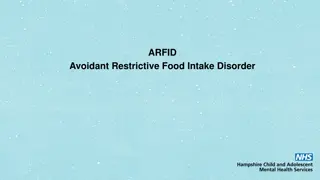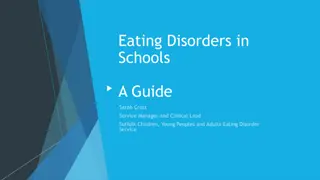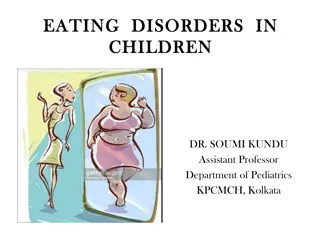ARFID: A Guide to Avoidant Restrictive Food Intake Disorder
Avoidant Restrictive Food Intake Disorder (ARFID) is a feeding and eating disorder characterized by significant weight loss, nutritional deficiency, and psychosocial impairment. Individuals may experience sensory sensitivity, lack of interest, or fear of aversive consequences. ARFID differs from pic
1 views • 18 slides
Eating Disorders in Schools: A Comprehensive Guide
This guide sheds light on the alarming increase in eating disorder referrals since March 2020, especially among young individuals. It explores the impact of lockdown on behaviors, provides insights into diagnostic features, behavioral indicators, and discusses ARFID. Early intervention is crucial fo
0 views • 10 slides
Eating Disorders in Children by Dr. Soumi Kundu
Eating disorders in children, such as anorexia nervosa, bulimia nervosa, and binge eating disorder, are complex biopsychosocial disorders characterized by dysfunctional patterns of cognition and weight control behaviors. They result in significant physical, psychological, and social complications. T
0 views • 34 slides
The Link Between Picky Eating and Avoidant/Restrictive Food Intake Disorder in High School Students
Picky eating behaviors in children can potentially lead to Avoidant/Restrictive Food Intake Disorder (ARFID) if not outgrown by age 6. Research indicates that parental pressure, aversive experiences, and specific eating characteristics are associated with picky eating tendencies that may predict ARF
0 views • 16 slides



